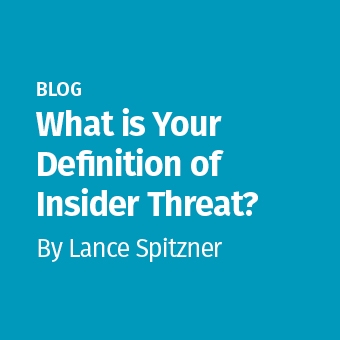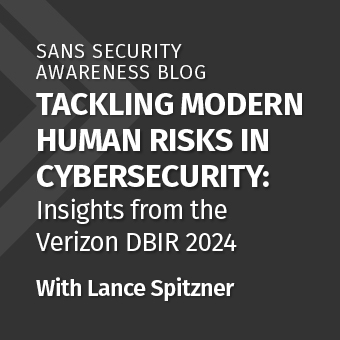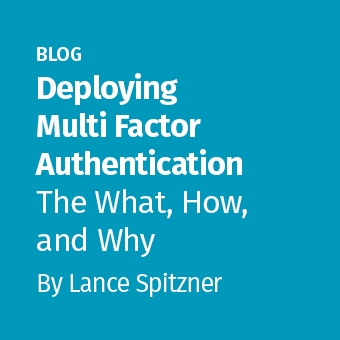Tags:

Floating in the vast social engineering ocean, lurks some pretty frightening phish. No matter the size of the threat, big phish or little phish, all organizations are at risk of an attack. In fact, the FBI’s Internet Crime Complaint Center reported that people lost $30 million to phishing schemes in one year.
The threats aren't confined within the workplace doors, either. There are things that people can do to protect themselves - and their data - on a personal level. And thanks to the tireless work that people like Cheryl Conley have contributed to the cybersecurity landscape, we have a better understanding on how to inform and train an organization's largest attack vector; our people.
Recently retired from Lockheed Martin's Corporate Information Security organization as a Senior Staff Lead for the Cyber Communications & Employee Engagement team, Conley is a regular presenter at the SANS Security Awareness Summits and an editorial board member for the SANS monthly OUCH! newsletter. She received the Lockheed Martin Excellence in Leadership Award for solving complex challenges in cybersecurity and the Catalyst Award Recognition in 2018. She also recently guest authored a piece on how to navigate the social engineering landscape for the SANS Security Awareness blog. As an expert in social engineering and a pioneer in the cybersecurity landscape, she was able to spend a few moments with SANS Security Awareness to discuss her key takeaways from the industry.
Q1. You come with a very deeply decorated background balancing personal and professional cyber safety across three+ decades. Can you describe the biggest change, in your opinion, from when you first started in your career to the security landscape you see today?
"Personally, I think the biggest change, for better or worse, is the instantaneous access we have to information now. People have the ability to communicate with anyone, anywhere within seconds with a wide range and multitude of devices. While this is a great communications opportunity, anywhere from sharing medical records to paying bills and education, it also opens the door for incredibly diverse attack landscapes.
I can remember when my cell phone wouldn’t fit in my briefcase, now I can put my phone, iPad, and company-issued laptop in a small case and still have room left over for other items. Everything and everyone is within reach. But if that case was lost or stolen, I better have those devices properly protected! I think that's the greatest difference, honestly. We're constantly connected. More than ever before. And it certainly comes with its advantages and disadvantages."
Q2. We often hear that employees are the largest targets of social engineering attacks. Where do you think organizations are perhaps failing when it comes to protecting themselves to eliminate their primary vulnerability?
"The 'easy way out' answer is to provide awareness opportunities for the employees, but that’s easier said than done. All organizations are different in how they can and will approach social engineering training and phishing simulation programs. A large, diverse defense organization or a bank will need to handle this much differently than a small university or entertainment company.
I do feel a big part of the issue is that employees walk around with a false sense of security. They believe there’s enough technology wrapped around the problem that they might not have to worry about attacks. But cameras, password requirements, VPN, external email labeling - there’s all kinds of tools, and many of us think that’s all that’s needed. This leaves our tech teams overwhelmed, feeling like they're protecting the keys of the kingdom.
Because of this, I’ve been working to promote social engineering awareness on a more personallevel. My hope is that this will “stick” with the individual and bleed over into their professional lives. Alternatively, if they can see the dangers and risks they face on a personal level, it may also get them to think twice before opening that suspicious-looking work email."
Q3. You bring up an interesting point about behavior change. In a person’s personal life, especially when it comes to social media, what, in your opinion, is their biggest misstep in keeping their personal data secure?
"If we’re talking about personal data, you know, SSN, banking information, medical content, all of those private and perhaps confidential details, I think the biggest misstep is the concept of passwords/passphrases. Accounts are getting hacked due to the lack of complexity and reuse.
Continuing under the social media umbrella, another worry bead for me is the issue of oversharing information. The TMI effect, if you will. People are oversharing their incredibly personal information to the internet world. Not just vacation and location types of content, but I get concerned when I see parents post information about their younger kids. A cute picture of an 11-year-old, for example, combined with other information could be troublesome, which could be an invitation for cyber stalkers. In addition, I’m concerned about identify theft with children, and generally parents don't really think about checking on that possibility until it’s too late."
Q4. In the realm of security awareness and education, where do you think you’ve made the biggest impact?
"While working at Lockheed Martin, I’d like to think I’ve made the biggest difference when I initiated both an awareness campaign and the corporate phishing program under the awareness umbrella. I’m certain we were the pioneers of large email testing programs and made many enhancements that have been recognized and consumed by other organizations starting and/or enhancing their program. That being said, we were a very, very small team, and all dedicated to the cause. It was a great time.
Outside of working at Lockheed Martin, I think I've made the biggest difference presenting the successes and lessons learned related to the email testing program, to include networking with other security awareness professionals. It was equally rewarding because I feel like I learned as much from them as they learned from me. This field we're navigating through is truly in its infancy and we leverage off of others’ work. It's wonderful to have a network.
Q5. Developing and maintaining an effective phishing program can be a tremendous undertaking. What are the three key ingredients in a thriving phishing simulation program?
- "Leadership support is paramount. Generally, you won't have a thriving, or any program without adequate support. This includes an “equal opportunity phishing simulation program” where all employees are tested, not just certain groups or excluding upper management.
- The next key ingredient would be ensuring you have continuous metrics “management”. You need the ability to assess where your program is, understand where you might be able go, and identify the riskier areas based on trending.
- Finally, once you have the leadership support and the ability to measure metrics, I'd say the last integral part of having a thriving program would be ensuring that your program offers a diverse range of training and awareness tactics. We all learn and absorb content differently, so training shouldn't be a one-size-fits-all approach."
Q6. Once you’ve got the phishing program up and running, it can be especially difficult if it lacks leadership buy-in that you mentioned a few moments ago. Can you provide awareness officers with your best advice in solidifying and retaining support for their phishing program?
"It’s hard for me to imagine, with all the publications and media surrounding cyber security issues, that there are leaders who don’t necessarily support a phishing program. When solidifying initial buy-in, I would suggest pointing out industry research such as the Verizon DBIR and the support of the leaders’ information security teams – the SOC or Incident Reporting teams.
If you really want to frighten leadership, have he or she google themself. It is amazing what kind of information is out there that can be harvested for a targeted phishing attack.
In retaining support, though, I feel metrics are key, providing they can show improvement in both undesired actions and reporting suspected malicious email. There’s money in metrics, and if leaders have a concise, easy to promote metrics package, they’re likely to encourage additional support and enhancement of the phishing program. I’m thinking ongoing testing for riskier groups: such as repeat clickers, executive admin assistants, system administrators, and so forth.



